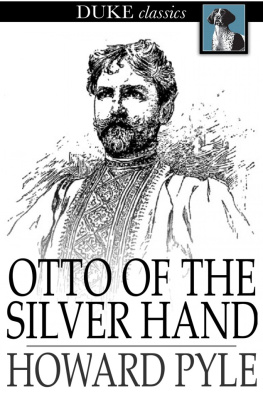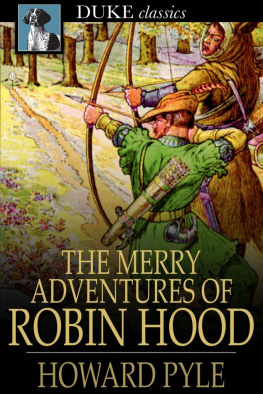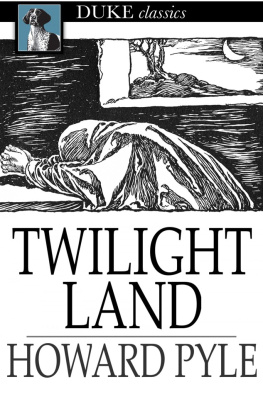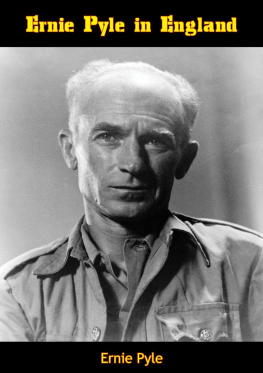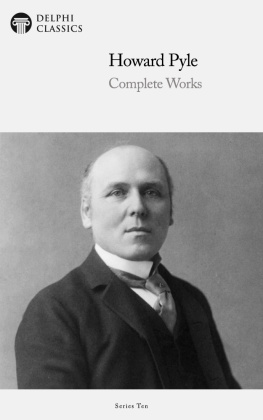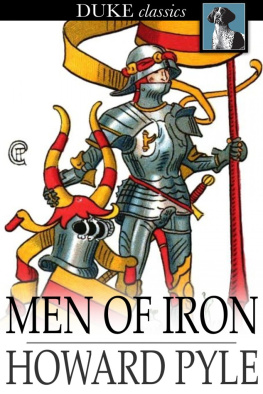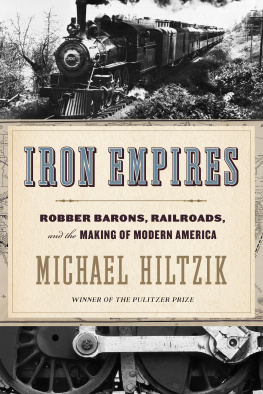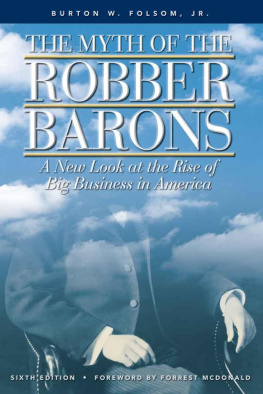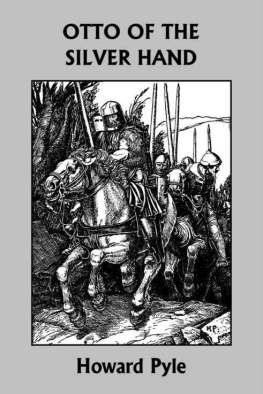Pyle - Otto of the Silver Hand
Here you can read online Pyle - Otto of the Silver Hand full text of the book (entire story) in english for free. Download pdf and epub, get meaning, cover and reviews about this ebook. City: Germany, year: 2012, publisher: Duke Classics, genre: Adventure. Description of the work, (preface) as well as reviews are available. Best literature library LitArk.com created for fans of good reading and offers a wide selection of genres:
Romance novel
Science fiction
Adventure
Detective
Science
History
Home and family
Prose
Art
Politics
Computer
Non-fiction
Religion
Business
Children
Humor
Choose a favorite category and find really read worthwhile books. Enjoy immersion in the world of imagination, feel the emotions of the characters or learn something new for yourself, make an fascinating discovery.
Otto of the Silver Hand: summary, description and annotation
We offer to read an annotation, description, summary or preface (depends on what the author of the book "Otto of the Silver Hand" wrote himself). If you haven't found the necessary information about the book — write in the comments, we will try to find it.
Otto of the Silver Hand — read online for free the complete book (whole text) full work
Below is the text of the book, divided by pages. System saving the place of the last page read, allows you to conveniently read the book "Otto of the Silver Hand" online for free, without having to search again every time where you left off. Put a bookmark, and you can go to the page where you finished reading at any time.
Font size:
Interval:
Bookmark:

First published in 1888
ISBN 978-1-62013-061-2
Duke Classics
2012 Duke Classics and its licensors. All rights reserved.
While every effort has been used to ensure the accuracy and reliability of the information contained in this edition, Duke Classics does not assume liability or responsibility for any errors or omissions in this book. Duke Classics does not accept responsibility for loss suffered as a result of reliance upon the accuracy or currency of information contained in this book.
Between the far away past history of the world, and that which lies nearto us; in the time when the wisdom of the ancient times was dead andhad passed away, and our own days of light had not yet come, there lay agreat black gulf in human history, a gulf of ignorance, of superstition,of cruelty, and of wickedness.
That time we call the dark or middle ages.
Few records remain to us of that dreadful period in our world's history,and we only know of it through broken and disjointed fragments that havebeen handed down to us through the generations.
Yet, though the world's life then was so wicked and black, there yetremained a few good men and women here and there (mostly in peacefuland quiet monasteries, far from the thunder and the glare of the worldsbloody battle), who knew the right and the truth and lived according towhat they knew; who preserved and tenderly cared for the truths that thedear Christ taught, and lived and died for in Palestine so long ago.
This tale that I am about to tell is of a little boy who lived andsuffered in those dark middle ages; of how he saw both the good and thebad of men, and of how, by gentleness and love and not by strife andhatred, he came at last to stand above other men and to be looked up toby all. And should you follow the story to the end, I hope you may findit a pleasure, as I have done, to ramble through those dark ancientcastles, to lie with little Otto and Brother John in the highbelfry-tower, or to sit with them in the peaceful quiet of the sunnyold monastery garden, for, of all the story, I love best those earlypeaceful years that little Otto spent in the dear old White Cross on theHill.
Poor little Otto's life was a stony and a thorny pathway, and it is wellfor all of us nowadays that we walk it in fancy and not in truth.
Up from the gray rocks, rising sheer and bold and bare, stood the wallsand towers of Castle Drachenhausen. A great gate-way, with a heavyiron-pointed portcullis hanging suspended in the dim arch above, yawnedblackly upon the bascule or falling drawbridge that spanned a chasmbetween the blank stone walls and the roadway that winding down thesteep rocky slope to the little valley just beneath. There in the lap ofthe hills around stood the wretched straw-thatched huts of the peasantsbelonging to the castlemiserable serfs who, half timid, half fierce,tilled their poor patches of ground, wrenching from the hard soil barelyenough to keep body and soul together. Among those vile hovels playedthe little children like foxes about their dens, their wild, fierce eyespeering out from under a mat of tangled yellow hair.
Beyond these squalid huts lay the rushing, foaming river, spanned by ahigh, rude, stone bridge where the road from the castle crossed it, andbeyond the river stretched the great, black forest, within whose gloomydepths the savage wild beasts made their lair, and where in winter timethe howling wolves coursed their flying prey across the moonlit snow andunder the net-work of the black shadows from the naked boughs above.
The watchman in the cold, windy bartizan or watch-tower that clung tothe gray walls above the castle gateway, looked from his narrow window,where the wind piped and hummed, across the tree-tops that rolled inendless billows of green, over hill and over valley to the blue anddistant slope of the Keiserberg, where, on the mountain side, glimmeredfar away the walls of Castle Trutz-Drachen.
Within the massive stone walls through which the gaping gateway led,three great cheerless brick buildings, so forbidding that even theyellow sunlight could not light them into brightness, looked down, withrow upon row of windows, upon three sides of the bleak, stone courtyard.Back of and above them clustered a jumble of other buildings, tower andturret, one high-peaked roof overtopping another.
The great house in the centre was the Baron's Hall, the part to the leftwas called the Roderhausen; between the two stood a huge square pile,rising dizzily up into the clear air high above the restthe greatMelchior Tower.
At the top clustered a jumble of buildings hanging high aloft in thewindy space a crooked wooden belfry, a tall, narrow watch-tower, and arude wooden house that clung partly to the roof of the great tower andpartly to the walls.
From the chimney of this crazy hut a thin thread of smoke would now andthen rise into the air, for there were folk living far up in that empty,airy desert, and oftentimes wild, uncouth little children were seenplaying on the edge of the dizzy height, or sitting with their barelegs hanging down over the sheer depths, as they gazed below at what wasgoing on in the court-yard. There they sat, just as little children inthe town might sit upon their father's door-step; and as the sparrowsmight fly around the feet of the little town children, so the circlingflocks of rooks and daws flew around the feet of these air-borncreatures.
It was Schwartz Carl and his wife and little ones who lived far up therein the Melchior Tower, for it overlooked the top of the hill behind thecastle and so down into the valley upon the further side. There, dayafter day, Schwartz Carl kept watch upon the gray road that ran like aribbon through the valley, from the rich town of Gruenstaldt to the richtown of Staffenburgen, where passed merchant caravans from the one tothe otherfor the lord of Drachenhausen was a robber baron.
Dong! Dong! The great alarm bell would suddenly ring out from the belfryhigh up upon the Melchior Tower. Dong! Dong! Till the rooks and dawswhirled clamoring and screaming. Dong! Dong! Till the fierce wolf-houndsin the rocky kennels behind the castle stables howled dismally inanswer. Dong! Dong!Dong! Dong!
Then would follow a great noise and uproar and hurry in the castlecourt-yard below; men shouting and calling to one another, the ringingof armor, and the clatter of horses' hoofs upon the hard stone. With thecreaking and groaning of the windlass the iron-pointed portcullis wouldbe slowly raised, and with a clank and rattle and clash of iron chainsthe drawbridge would fall crashing. Then over it would thunder horse andman, clattering away down the winding, stony pathway, until the greatforest would swallow them, and they would be gone.
Then for a while peace would fall upon the castle courtyard, the cockwould crow, the cook would scold a lazy maid, and Gretchen, leaning outof a window, would sing a snatch of a song, just as though it were apeaceful farm-house, instead of a den of robbers.
Maybe it would be evening before the men would return once more. Perhapsone would have a bloody cloth bound about his head, perhaps one wouldcarry his arm in a sling; perhaps onemaybe more than onewould beleft behind, never to return again, and soon forgotten by all exceptingsome poor woman who would weep silently in the loneliness of her dailywork.
Nearly always the adventurers would bring back with them pack-horsesladen with bales of goods. Sometimes, besides these, they would returnwith a poor soul, his hands tied behind his back and his feet beneaththe horse's body, his fur cloak and his flat cap wofully awry. A whilehe would disappear in some gloomy cell of the dungeon-keep, until anenvoy would come from the town with a fat purse, when his ransom wouldbe paid, the dungeon would disgorge him, and he would be allowed to goupon his way again.
Font size:
Interval:
Bookmark:
Similar books «Otto of the Silver Hand»
Look at similar books to Otto of the Silver Hand. We have selected literature similar in name and meaning in the hope of providing readers with more options to find new, interesting, not yet read works.
Discussion, reviews of the book Otto of the Silver Hand and just readers' own opinions. Leave your comments, write what you think about the work, its meaning or the main characters. Specify what exactly you liked and what you didn't like, and why you think so.

